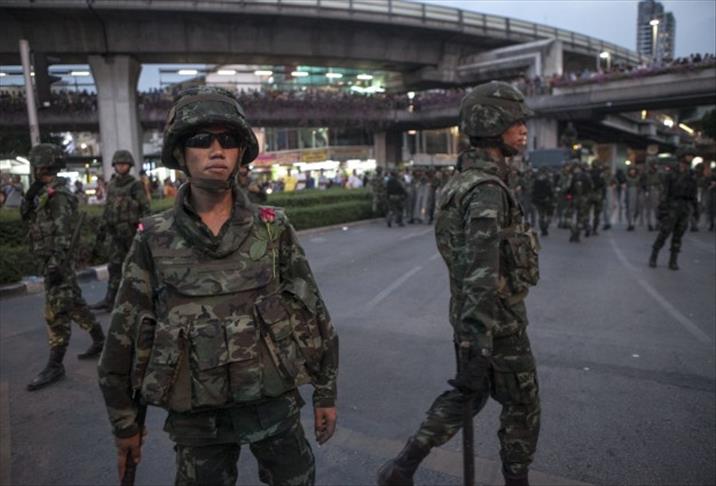
BANGKOK
Human Rights Watch has criticized Thailand’s military government for what it calls the "severe repression of fundamental rights and freedoms" in the wake of the May 22 coup.
In a statement Tuesday, it accused the country's ruling National Council for Peace and Order (NCPO) of showing no genuine signs of restoring democratic civilian rule.
“Respect for fundamental freedoms and democracy in Thailand under military rule has fallen into an apparently bottomless pit,” said Brad Adams, the organization’s Asia director.
“Six months after the coup, criticism is systematically prosecuted, political activity is banned, media is censored and dissidents are tried in military courts.”
The statement underlined that protesters who expressed disagreement with the junta - "such as by showing the three-finger salute used in 'The Hunger Games' movies as an act of defiance, putting duct tape or a hand over their mouths in public or in photos posted on Facebook" - face a possible two-year prison term.
After a lull of nearly five months, political protests have re-emerged on the streets of the Thai capital. On Thursday, three students were arrested at the Bangkok opening of the latest "Hunger Games" movie. Characters in the film use a defiant three-fingered salute that has been adopted by those opposed to Prime Minister Prayuth Chan-ocha’s regime.
Chan-ocha, a former general who relinquished his army position when the military seized power in May, is under pressure from the media and academics to lift restrictions on association and free speech.
On Nov. 17 he announced that criticizing or obstructing him, the government or the NCPO was "unacceptable."
Adams said that on Nov. 21 Chan-ocha had also undermined his claims that a road map existed to return to civilian democratic rule through free and credible elections.
“Don’t ask me to give you democracy and elections. This is not the right time,” he stated. Prayuth had then added that the enforcement of martial law would continue “as long as necessary.”
Outside of alleged restrictions on free speech, the organization also criticized what it said were repeated vows by the junta to prosecute critics of the monarchy.
Thai authorities have frequently used the offense of lese majeste - under article 112 of the penal code - to intimidate, arrest and prosecute people accused of criticizing the king and members of the royal family.
At least 14 new lese majeste cases are pending in the Bangkok military court and in criminal courts around Thailand, and on Nov. 12 national police chief General Somyot Poompanmuang announced a ban on the book “A Kingdom in Crisis: Thailand’s Struggle for Democracy in the Twenty-First Century," claiming that it insulted and fomented hatred of members of the royal family.
HRW said that the junta has also tightened restrictions on media, and highlighted a Nov. 13 speech by Lieutenant General Suchai Pongput - the NCPO-appointed head of a special committee to monitor the media - in which he said that reporting needed to be controlled to ensure reconciliation in society: “We do not limit media freedom but freedom must be within limits.”
The organization added that public forums on issues such as land reform, forest conservation, energy policy and tax policy have been canceled by the military citing concerns that the discussions could fuel social divisions.
Any gathering of more than five people can also be prohibited under martial law.
“Instead of a path toward the return of democracy, the junta is tightening its grip on free speech and any public criticism,” Adams said.
“Simply offering an opinion on politics can land a person in military court and prison. The junta needs to reverse course and revoke martial law, end rights abuses and take concrete steps towards democratic elections if it wants to persuade the international community it’s not a dictatorship.”
The military overthrew Yingluck Shinawatra's civil government after seven months of massive anti-government demonstrations mostly joined by Bangkok’s middle-classes and the country’s conservative elite.
Yingluck had largely won the July 2011 elections with votes from the country's Red Shirts movement - predominantly from the country's rural northeast.
Martial law was declared two days before the coup. Immediately after the military takeover hundreds of academics, activists and journalists were briefly detained in camps and soldiers deployed across Bangkok to counter protests.
Anadolu Agency website contains only a portion of the news stories offered to subscribers in the AA News Broadcasting System (HAS), and in summarized form. Please contact us for subscription options.

